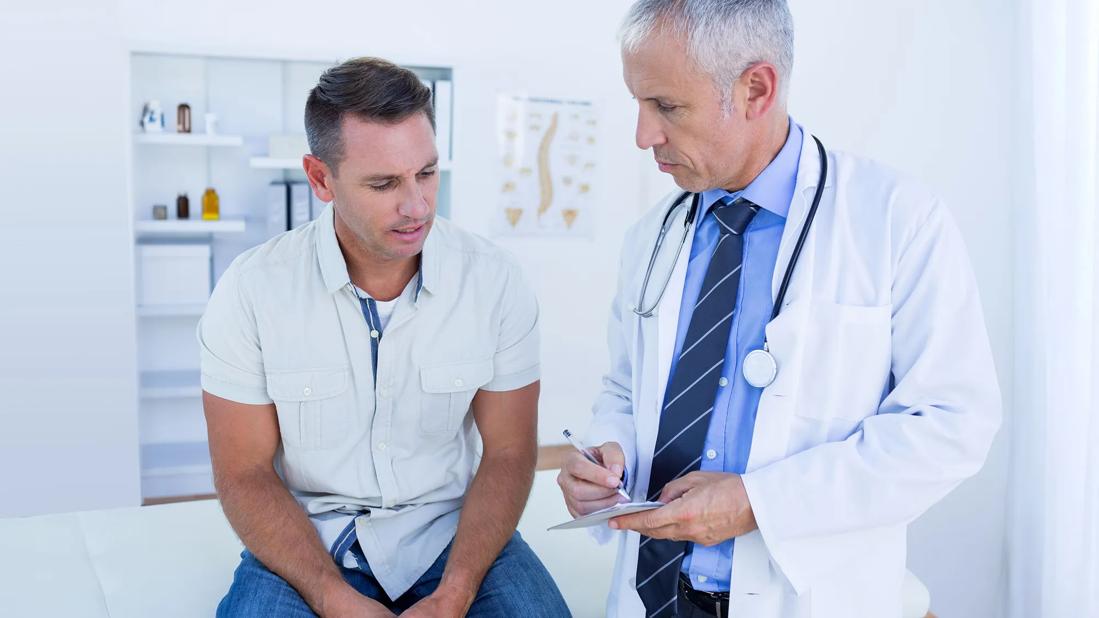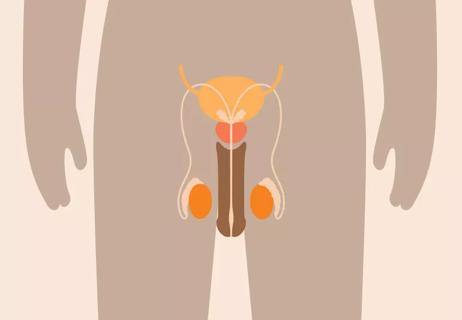An unexplained lump, swelling, discomfort or changes to your testicles shouldn’t be ignored

Have you checked your testicles lately? If not, you might want to give them a once-over to search for any signs of testicular cancer.
Advertisement
Cleveland Clinic is a non-profit academic medical center. Advertising on our site helps support our mission. We do not endorse non-Cleveland Clinic products or services. Policy
But what should you be looking for down there? Oncologist Shilpa Gupta, MD, has your answer.
Here are seven common signs of testicular cancer that deserve your attention. Keep in mind that many of the symptoms can occur with other conditions, too. So, they don’t always mean cancer — but they do merit an appointment with a healthcare provider for examination.
Perhaps the most common early warning sign of testicular cancer is a lump or bump on your testicles. Most of the time, the lump won’t cause pain. But some people report feeling some discomfort.
A quick self-exam once a month is the best way to search for lumps on your testicles. Perform the check after a shower or bath, as the warm water relaxes the scrotum and makes the inspection easier.
Here’s how to do the exam:
Advertisement
As you feel each testicle, you’ll no doubt notice a cord-like structure on top and in the back. This structure is called the epididymis, and it stores and transports sperm.
It’s important to familiarize yourself with what’s “normal” for your testicle so you can recognize your epididymis plus any changes or abnormalities, says Dr. Gupta. (Don’t be surprised if one testis is slightly larger than the other.)
Pro tip: Doing a self-exam after a visit to your doctor can help you get a feel for what’s “normal.”
Your testicles usually feel like … well, testicles. They hang around and don’t call much attention to themselves.
That’s why you should pay attention if the situation changes. Testicles that suddenly feel “heavier” or like they’re under some sort of pressure could be a sign of testicular cancer or another issue.
“It’s important not to ignore any of these sorts of symptoms,” stresses Dr. Gupta.
Testicles that suddenly appear larger could signal a fluid backup in your scrotum. This accumulation could be an early sign of testicular cancer or another issue that warrants a visit to a healthcare provider.
Swollen testicles that come with redness or warmth typically indicate an infection, not cancer. “But always get checked out if you feel a sudden accumulation of fluid in your scrotum,” advises Dr. Gupta.
Size matters when it comes to monitoring your testicles.
Certain types of testicular tumors can lead to hormonal changes — like a reduction in testosterone or an increase in estrogen — that can alter testicle size or firmness. (This can include a shrinking testicle, known as testicular atrophy.)
Testicular cancer sometimes causes deep vein thrombosis (DVT), where a blood clot forms in a vein deep within your body — typically, in a leg. This can result in swelling, pain and tenderness.
Why does this happen? It’s because testicular cancer can cause abnormal clotting or produce substances that increase the risk of clot formation.
Contact a healthcare provider ASAP if you experience unexplained swelling in your legs. “It’s essential to seek medical attention promptly, as blood clots can lead to serious issues, like a heart attack or stroke,” emphasizes Dr. Gupta.
Testicular cancer that goes untreated and advances can cascade into other issues, including:
Advertisement
“These are generalized symptoms, but they can be signs of more advanced testicular cancer,” notes Dr. Gupta. “It’s important not to ignore these.”
Hormonal changes from testicular cancer can sometimes cause breast tenderness or the growth of breast tissue. Some tumors can secrete high levels of a hormone called human chorionic gonadotropin (HCG), which stimulates breast development.
“If men notice sudden breast tenderness or swelling, it’s recommended to get it checked out,” says Dr. Gupta.
Testicular cancer is a relatively rare disease that’s typically curable if found early. The disease is the most diagnosed cancer in men ages 15 to 35 — a group with a relatively low overall cancer risk.
“It’s important to get care quickly if you’re experiencing symptoms because testicular cancers usually grow fast,” explains Dr. Gupta. “Up to 95% of people with testicular cancer are cured, but earlier treatment brings a greater chance for success.”
Bottom line? If you experience any signs of testicular cancer, make an appointment with a healthcare provider right away to get checked out.
Advertisement
Learn more about our editorial process.
Advertisement

A self-exam takes only two minutes once a month

A variety of factors can cause temporary or more lasting changes in penis length

Arousal without orgasm can be uncomfortable, but it’s no reason to pressure sexual interactions

The list includes eating a healthier diet, managing your weight and reducing stress

Adjusting your diet to focus on plant-based, whole foods may improve erectile function

Here’s what you need to know about ED, which most men experience to some degree during their lives

‘Morning wood’ is a natural bodily function and a sign of sexual health

Yes, new fathers can experience mood changes after bringing baby home

The tropical fruit is a good source of antioxidants and vitamin C

Most people fall asleep within 10 to 20 minutes, but if your experience is different, adjusting your sleep schedule may help

Exploring your hidden side can lead to better understanding of what makes you tick